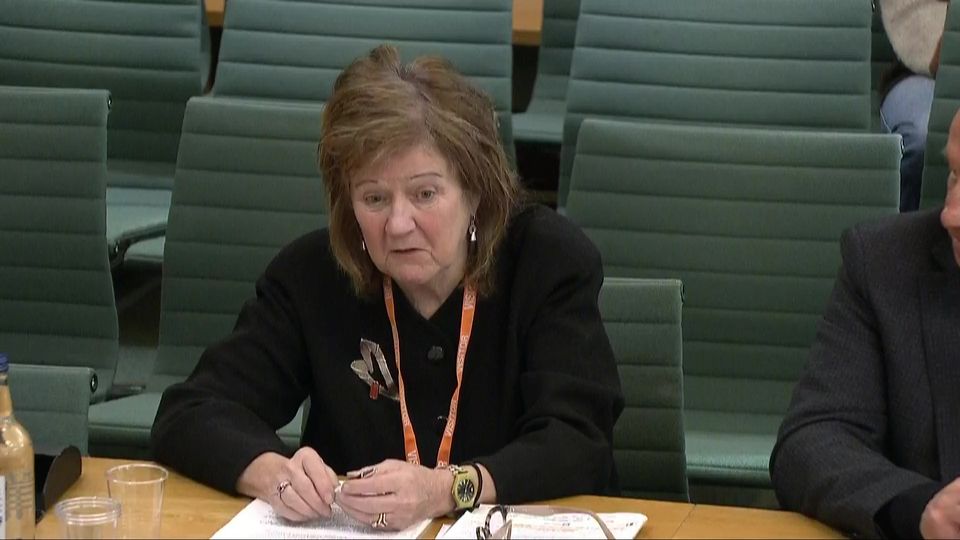Abuse victims will be able to bring compensation claims when they are ready rather than being bound by a three-year time limit, under reforms the Government has acknowledged are “long overdue”.
As well as the deadline to bring personal injury claims being scrapped, apologies will also be made easier to achieve, the Ministry of Justice (MoJ) said as it announced two more of the 20 recommendations from the 2022 final report of the Independent Inquiry into Child Sexual Abuse (IICSA) are being acted on.
It is expected both reforms will be part of Bills due to be brought before Parliament in the next year.
Professor Alexis Jay (House of Commons/UK Parliament/PA)
Home Secretary Yvette Cooper last month said the Government will lay out a clear timetable by Easter for implementing the recommendations in the final report.
While the inquiry’s former chairwoman, Professor Alexis Jay, said at that stage that she welcomed Ms Cooper’s commitment to implement the recommendations, she added that progress must take place “as speedily as possible”.
She added that “much valuable time has already been lost” since the final report was published in October 2022, “causing even more trauma to many victims and survivors”.
Last month the Government confirmed it would introduce a mandatory reporting duty for those working with children to report sexual abuse as part of the Crime and Policing Bill.
The long wait for IICSA recommendations to be implemented hit the headlines in January after billionaire X owner Elon Musk made comments online in relation to child grooming.
Prime Minister Sir Keir Starmer accused him and others of “spreading lies and misinformation”, but within weeks the Home Office had announced an audit looking into the scale and nature of “gang-based exploitation” across the country as well as local reviews into grooming in some areas.
The Government said on Wednesday that the latest reforms will ensure victims are prioritised, with changes to the Law of Apologies and Limitation Law, after two consultations last year.
The changes will see the three-year time limit for victims to bring personal injury claims removed, and the burden of proof moved from victims to defendants, who would have to show a fair trial cannot proceed if they intend to block one.
Kim Harrison, a lawyer who represented survivors at IICSA, said the time limit – which currently requires civil child sexual abuse claims to be brought within three years of the victim turning 18 – is “wholly inappropriate”.
Employers will also be encouraged to apologise to people wronged by their employees, with the law set to be amended to prevent fear around institutional liability getting in the way.
The MoJ said victims will be likelier to receive apologies from schools, care facilities or hospitals for abuse carried out by someone who worked at such institutions.
Prof Jay’s final report said apologies should be “genuine and meaningful”, made directly to the individual and, if requested, face-to-face.
Her report added: “A conditional statement, such as ‘if you were abused, then we are sorry’, is not an apology.”
Gabrielle Shaw, chief executive of the National Association for People Abused in Childhood (NAPAC), described the latest announcements as a “watershed moment for survivors of child sexual abuse”.
She said: “These reforms recognise the long-term impact of trauma and ensure survivors are not excluded from seeking redress simply because of the time taken to come forward.
“NAPAC also welcomes greater clarity on apologies. A sincere apology, when freely given and supported by meaningful action, is invaluable – especially as part of wider efforts to ensure accountability and prevent future harm.”
Ms Harrison, president of not-for-profit campaign organisation APIL (the Association of Personal Injury Lawyers), said it takes sex abuse survivors an average of between 24 and 27 years “to be able to tell a soul about the abuse they suffered, let alone pursue justice”.
She added: “For victims and survivors to find the strength to bring their cases and then to be told that they were not quick enough to act is devastating, and a significant barrier to justice.”
Justice Secretary Shabana Mahmood said: “Child sexual abuse causes lifelong trauma and these important changes, recommended by Professor Jay, are long overdue.
“These measures help survivors pursue their path to justice. They build on the Government’s mission of halving violence against women and girls and support our Plan for Change.”
Justice Minister Sarah Sackman said: “The courts must work for the public they serve, and we recognise that victims and survivors need time to process their trauma.
“By changing the law, it will now be possible for victims to come forward and seek justice when they feel ready to do so.”
The Government said the apologies legislation would not apply to public inquiries or defamation cases and will not be retrospective.
The NSPCC welcomed the latest announcement but said it is “vital” the other recommendations are followed up on, including a guarantee of specialist therapeutic support for child victims of sexual abuse.
